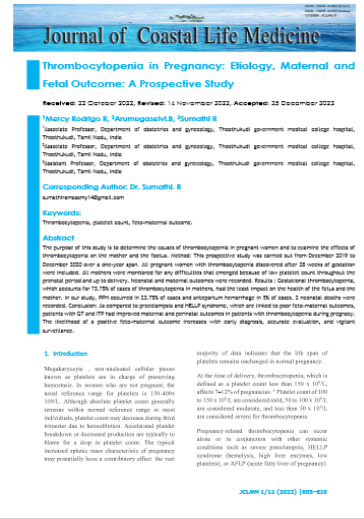Thrombocytopenia in Pregnancy: Etiology, Maternal and Fetal Outcome: A Prospective Study
Main Article Content
Abstract
The purpose of this study is to determine the causes of thrombocytopenia in pregnant women and to examine the effects of thrombocytopenia on the mother and the foetus. Method: This prospective study was carried out from December 2019 to December 2020 over a one-year span. All pregnant women with thrombocytopenia discovered after 28 weeks of gestation were included. All mothers were monitored for any difficulties that emerged because of low platelet count throughout the prenatal period and up to delivery. Neonatal and maternal outcomes were recorded. Results : Gestational thrombocytopenia, which accounts for 73.75% of cases of thrombocytopenia in mothers, had the least impact on the health of the fetus and the mother. In our study, PPH occurred in 23.75% of cases and antepartum hemorrhage in 5% of cases. 2 neonatal deaths were recorded. Conclusion: As compared to preeclampsia and HELLP syndrome, which are linked to poor feto-maternal outcomes, patients with GT and ITP had improved maternal and perinatal outcomes in patients with thrombocytopenia during pregnacy. The likelihood of a positive feto-maternal outcome increases with early diagnosis, accurate evaluation, and vigilant surveillance.
Article Details
References
ACOG Practice Bulletin No. 207: Thrombocytopenia in Pregnancy. Obstet Gynecol 2019 Mar;133(3):e181-e193.
Rajesh Kashyap1., Akanksha G., Mandakini P .Maternal and Fetal Outcomes of Pregnancy in Patients with Immune Thrombocytopenia. The Journal of Obstetrics and Gynecology of India (March–April 2021) 71(2):124–130.
Arora M, Goyal L, Khutan H. Prevalence of Thrombocytopenia during Pregnancy & Its Effect on Pregnancy & Neonatal Outcome . Ann. Int. Med. Den. Res. 2017; 3(2):ME04-ME06.
Maayan-Metzger A, Leibovitch L, Schushan-Eisen I, et al. Predictors for neonatal thrombocytopenia in infants of thrombocytopenic mothers during pregnancy. Pediatr Blood Cancer 2010;55:145–8.

